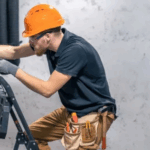
Blocked drains are a common nuisance in London, potentially leading to severe inconvenience and costly damage if not addressed promptly. Thankfully, with expert services available across the city, residents and business owners can find quick solutions to their drain issues. This article explores the complexities of Blocked Drains London, including the causes, impacts, and professional solutions offered to remedy this pervasive problem.
Understanding Blocked Drains
Blocked drains can occur in residential, commercial, and public settings, each presenting unique challenges. They are typically caused by the accumulation of foreign materials such as fats, oils, hair, and other debris that should not be disposed of via the drainage system.
Common Causes of Drain Blockages:
- Kitchen waste: Grease, food particles, and oils solidify in pipes, leading to clogs.
- Bathroom waste: Hair, soap, and personal care products can build up and block water flow.
- Toilet waste: Flushing non-degradable items like wipes and sanitary products.
- Outdoor drains: Leaves, silt, and debris can accumulate in outdoor drainage systems, especially after heavy rain.
Understanding these common causes helps in taking preventive measures and addressing the root of the problem when blockages occur.
The Impact of Blocked Drains
The consequences of blocked drains extend beyond mere inconvenience; they can cause serious issues such as:
- Water back-up and flooding: This can lead to property damage, particularly in basements and lower levels.
- Health hazards: Standing water can become a breeding ground for bacteria and pests, posing health risks.
- Foul odors: Blockages often cause unpleasant odors that can permeate through the property.
- Structural damage: Chronic water back-up can weaken structural components of buildings.
Given these risks, it’s crucial to address drain blockages as soon as they are detected.
Professional Solutions for Blocked Drains in London
When it comes to resolving blocked drains, London residents and businesses have access to professionals equipped with the latest technology and techniques. These experts offer comprehensive services that ensure not just remediation but also prevention of future blockages.
Advanced Techniques Used in Unblocking Drains
- CCTV Drain Surveys: Technicians employ CCTV cameras to inspect drains internally, pinpointing the exact location and nature of the blockage without invasive digging.
- High-Pressure Water Jetting: This method uses high-pressure water streams to break down and dislodge blockages, clearing the drain effectively.
- Rodding: Flexible rods are used to manually remove blockages in more accessible drains.
These techniques allow for tailored solutions based on the specific issues detected during initial assessments.
Choosing the Right Service Provider
When selecting a service to handle blocked drains London, consider the following factors:
- Experience and Expertise: Look for providers with a solid track record in dealing with a variety of blocked drain issues.
- Availability: Opt for services that offer emergency call-outs, ensuring 24/7 availability to address urgent blockages.
- Equipment and Techniques: Ensure the provider uses the latest technology and safe, effective methods.
- Customer Reviews: Check reviews and testimonials to gauge the reliability and efficiency of the service.
Preventive Measures to Avoid Future Blockages
While professional drain cleaning services are crucial, taking preventive measures can significantly reduce the likelihood of future blockages:
- Regular maintenance: Schedule regular drain cleaning to prevent the accumulation of blockage-causing debris.
- Dispose of waste properly: Avoid disposing of oils, grease, and non-biodegradable items down the drain.
- Use drain guards: These can help catch hair and other debris before they enter the drainage system.
By understanding the causes and consequences of blocked drains and utilizing professional drainage services, Londoners can ensure their drainage systems remain clear and functional. This proactive approach not only alleviates immediate distress caused by blocked drains but also contributes to the overall maintenance and longevity of plumbing infrastructures in urban environments.






